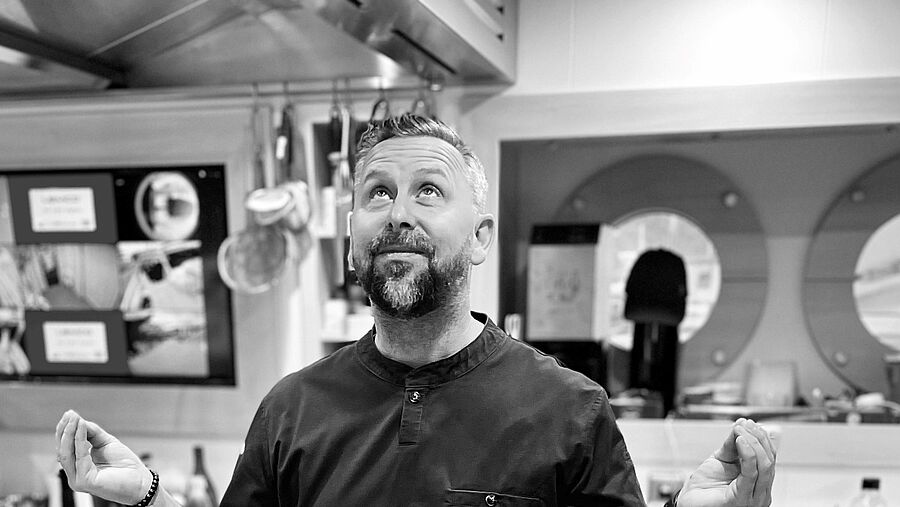From the Kitchen to the Galley
A happy crew is a happy boat – and the key is often through the stomach. Sascha Lenz sat down with Chrissie McClatchie to share his experience as a chef on board.

When Sascha Lenz decided to swap Michelin-star kitchens for superyacht galleys a decade ago, the transition seemed like a natural one. Across restaurants in Germany, Austria and Switzerland, he had built a career on exquisitely presented and delicately flavoured dishes that pleased the most discerning of diners, including wealthy families who owned, among their assets, private yachts.
The last thing he had thought about, however, was feeding the crew.
In a Michelin-star restaurant, I was cooking what I wanted, not what the Australian customer sitting at one of the tables asked for,
Lenz laughs. One of his earliest lessons on water, however, was that a happy crew is a happy boat — and the key to that is, more often than not, through their stomachs, so it paid to listen to what that chatty Australian in the crew mess was asking for, even if it meant he had to go and quickly Google exactly what a quesadilla was.
As the Head Chef on board Avantage, a fully private 87m Lürssen delivered in 2020, Lenz’s galley team of three have over 30 colleagues to feed breakfast, lunch and dinner to daily. And while owners and guests have some particular requirements often involving rare and hard-to-source inChef Sascha Lenz has been working on superyachts for a decade gredients, today’s crew know what they want to eat — and sometimes that’s the bigger challenge.
“Cooking for crew can be more difficult than cooking for guests,” Lenz acknowledges, especially in an increasingly health-conscious era overflowing with various dietary requirements. The sweet spot is in nutritious food that powers crew through the day, while also satisfying their taste buds.
So, where do you begin?
For Lenz, the answer lies in fresh products — “nothing convenient,” he says — that can be worked into a variety of cuisines. Foods like fish and chicken that can be steamed and grilled one day and then served over salads the next. And, perhaps most crucially, imagination when it comes to repurposing anything that’s left. “I’ll make a chicken Caesar salad from a leftover chicken, for example,” he explains, “or fish pie with mashed potato and cheese on top from fish the next day — you should see the empty plates,” he smiles.
Snacks and hydration are also key to keeping the crew energised through the tricky mid-afternoon slump. Onboard Avantage, they know that come 3pm, a spread awaits them — “like teatime in England,” Lenz jokes. “We’ll make shakes and our own biscuits, as well as nutrient bowls with chia seeds. The next day, we might serve up a banana cake with cream on top.”
Alongside the bottled drinks provisioned by the interior team, the crew stays rehydrated with plenty of fruit smoothies, freshly squeezed lemonade and anything that can be fashioned out of leftovers. “When the guests don’t eat all their watermelons, I’ll make watermelon shakes for the crew.”
The preference is for home — or “boat” — made wherever possible.
We don’t buy many Haribos and packets of crisps, we make our own snacks, including crudités and hummus,
Lenz says.
For breakfast, preparation starts the day before. “We soak oats overnight and cook porridge,” he explains. “The crew likes an easy and light start to the day.”
And, of course, consideration has to be made for the nutritional needs of different departments. “With the sun, the salt, and the jumping in and out of the water and the tenders, the deck crew can’t survive on salads,” says Lenz. “They need full plates — sandwiches, burgers, pasta, etc. Whereas the interior crew, even when they are busy, are often happy with salads all day.”
Lenz knows that size matters when it comes to storage and is fortunate to have a fridge and freezer capacity to store up to seven weeks of high-quality ingredients to feed the crew. And, he also knows that the stakes are higher when the boat is in full guest mode and cruising — because the buck stops with what is served out of the galley. “When you’re at anchor, the food has to be really, really good,” he says.
Off-season is when Lenz, who works on a two-month rotation with another head chef, can relax a little more. “We’ll cook on Friday for the weekend, and the crew onboard can reheat the food in the microwave. We’ll have a bar to make your own wraps, make your own salads, and the like.”
And, he’ll always accommodate any special dietary requirements — unless you act like an old colleague who turned vegan overnight to impress a new crew member. “They were eating sausages the day before and suddenly they were vegan,” he laughs. “Otherwise I’m totally cool with it.”